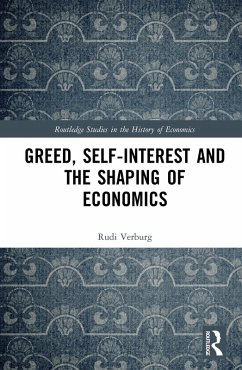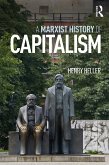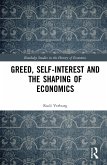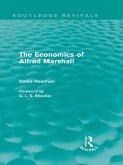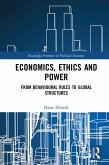Rudi Verburg
Greed, Self-Interest and the Shaping of Economics (eBook, PDF)
42,95 €
42,95 €
inkl. MwSt.
Sofort per Download lieferbar

21 °P sammeln
42,95 €
Als Download kaufen

42,95 €
inkl. MwSt.
Sofort per Download lieferbar

21 °P sammeln
Jetzt verschenken
Alle Infos zum eBook verschenken
42,95 €
inkl. MwSt.
Sofort per Download lieferbar
Alle Infos zum eBook verschenken

21 °P sammeln
Rudi Verburg
Greed, Self-Interest and the Shaping of Economics (eBook, PDF)
- Format: PDF
- Merkliste
- Auf die Merkliste
- Bewerten Bewerten
- Teilen
- Produkt teilen
- Produkterinnerung
- Produkterinnerung

Bitte loggen Sie sich zunächst in Ihr Kundenkonto ein oder registrieren Sie sich bei
bücher.de, um das eBook-Abo tolino select nutzen zu können.
Hier können Sie sich einloggen
Hier können Sie sich einloggen
Sie sind bereits eingeloggt. Klicken Sie auf 2. tolino select Abo, um fortzufahren.

Bitte loggen Sie sich zunächst in Ihr Kundenkonto ein oder registrieren Sie sich bei bücher.de, um das eBook-Abo tolino select nutzen zu können.
Since 2008, profound questions have been asked about the driving forces and self-regulating potential of the economic system, political control and morality. With opinion turning against markets and self-interest, economists found themselves on the wrong side of the argument. This book explores how the economics of the past can contribute to today's debates.
- Geräte: PC
- mit Kopierschutz
- eBook Hilfe
- Größe: 6.66MB
Andere Kunden interessierten sich auch für
![A Marxist History of Capitalism (eBook, PDF) A Marxist History of Capitalism (eBook, PDF)]() Henry HellerA Marxist History of Capitalism (eBook, PDF)39,95 €
Henry HellerA Marxist History of Capitalism (eBook, PDF)39,95 €![Greed, Self-Interest and the Shaping of Economics (eBook, ePUB) Greed, Self-Interest and the Shaping of Economics (eBook, ePUB)]() Rudi VerburgGreed, Self-Interest and the Shaping of Economics (eBook, ePUB)42,95 €
Rudi VerburgGreed, Self-Interest and the Shaping of Economics (eBook, ePUB)42,95 €![The Economics of Alfred Marshall (Routledge Revivals) (eBook, PDF) The Economics of Alfred Marshall (Routledge Revivals) (eBook, PDF)]() David ReismanThe Economics of Alfred Marshall (Routledge Revivals) (eBook, PDF)39,95 €
David ReismanThe Economics of Alfred Marshall (Routledge Revivals) (eBook, PDF)39,95 €![Capital Theory and Political Economy (eBook, PDF) Capital Theory and Political Economy (eBook, PDF)]() Lefteris TsoulfidisCapital Theory and Political Economy (eBook, PDF)40,95 €
Lefteris TsoulfidisCapital Theory and Political Economy (eBook, PDF)40,95 €![Richard Cantillon's Essay on the Nature of Trade in General (eBook, PDF) Richard Cantillon's Essay on the Nature of Trade in General (eBook, PDF)]() Richard CantillonRichard Cantillon's Essay on the Nature of Trade in General (eBook, PDF)42,95 €
Richard CantillonRichard Cantillon's Essay on the Nature of Trade in General (eBook, PDF)42,95 €![Populism and Neoliberalism (eBook, PDF) Populism and Neoliberalism (eBook, PDF)]() David CaylaPopulism and Neoliberalism (eBook, PDF)35,95 €
David CaylaPopulism and Neoliberalism (eBook, PDF)35,95 €![Economics, Ethics and Power (eBook, PDF) Economics, Ethics and Power (eBook, PDF)]() Hasse EkstedtEconomics, Ethics and Power (eBook, PDF)42,95 €
Hasse EkstedtEconomics, Ethics and Power (eBook, PDF)42,95 €-
-
-
Since 2008, profound questions have been asked about the driving forces and self-regulating potential of the economic system, political control and morality. With opinion turning against markets and self-interest, economists found themselves on the wrong side of the argument. This book explores how the economics of the past can contribute to today's debates.
Dieser Download kann aus rechtlichen Gründen nur mit Rechnungsadresse in A, B, BG, CY, CZ, D, DK, EW, E, FIN, F, GR, HR, H, IRL, I, LT, L, LR, M, NL, PL, P, R, S, SLO, SK ausgeliefert werden.
Produktdetails
- Produktdetails
- Verlag: Taylor & Francis eBooks
- Seitenzahl: 226
- Erscheinungstermin: 15. März 2018
- Englisch
- ISBN-13: 9781351977807
- Artikelnr.: 54037904
- Verlag: Taylor & Francis eBooks
- Seitenzahl: 226
- Erscheinungstermin: 15. März 2018
- Englisch
- ISBN-13: 9781351977807
- Artikelnr.: 54037904
- Herstellerkennzeichnung Die Herstellerinformationen sind derzeit nicht verfügbar.
Rudi Verburg was assistant professor in the history and philosophy of economic thought at the Erasmus University Rotterdam. Recently he joined the research project 'What Good Markets are good for' as part-time researcher at the Vrije Universiteit Amsterdam. He has published books and articles on topics ranging from values and institutions, social cohesion, solidarity and care, and the history of economic thought.
1. Shifting narratives and the emergence of political economy
1.1 Shifting narratives
1.2 Perspective and aim
1.3 The ascent of the positive-sum narration
1.4 Outline of the study; 2 The rise of greed in early economic thought: from deadly sin to social benefit
2.1 Introduction
2.2 The first stage: the self-sufficient community
2.3 The second stage: the mercantile state
2.4 The third stage in greed's rise to serviceability; 2.5 Conclusion; 3 The Mandevillean triangle
3.1 The powerful mix of pride and greed
3.2 The debate in perspective
3.3 Mandeville
the basic model and its challenges
3.4 Hume: sociability and the socialisation of vanity and greed
3.5 Rousseau: 'public identities
private unhappiness' 3.6 Mirror images of commercial society; 4 Adam Smith's struggle with Rousseau's critique of commercial society
4.1 Balancing out favourably? 4.2 Smith's general frame of thought
4.3 Adam Smith's first response in the Theory of Moral Sentiments and the Early Draft of the Wealth of Nations
4.4 Strengthening the argument: the second edition of The Theory of Moral Sentiments and the Wealth of Nations
4.5 The two roads of the sixth edition of the Theory of Moral Sentiments
4.6 Growing doubts; 5 Self-interest after Smith: from passion to behavioural assumption
5.1 Turn of the tide
5.2 A new frame of reference unfolding
5.3 Malthus's third way
5.4 Ricardian economics
Bentham's utilitarianism and the Philosophical Radicals 5.5 Christian theology
the Oriel Noetics and methodology of political economy 5.6 The concept of self-interest: from passion to behavioural assumption 5.7 The cutting edge of romanticism 5.8 Conclusion; 6 The wheels of 'greed
and the war amongst the greedy'
6.1 Robert Owen
6.2 Thompson's inquiry to reconcile security with equality
6.3 Friedrich Engels
6.4 Marx's analysis of the 'war amongst the greedy'
6.5 Opposite narratives 7 The neoclassical turn and the fading-out of greed and pride
7.1 Political economy in disarray
7.2 The neoclassical turn and the redefinition of self-interest
7.3 The fading-out of greed and pride in economics
7.4 Veblen's pecuniary culture and invidious distinction
7.5 Shading into sociology; 8 'It was the epoch of belief
it was the epoch of incredulity'
8.1 Ousting greed and pride
8.2 Belief in the positive-sum narrative
1.1 Shifting narratives
1.2 Perspective and aim
1.3 The ascent of the positive-sum narration
1.4 Outline of the study; 2 The rise of greed in early economic thought: from deadly sin to social benefit
2.1 Introduction
2.2 The first stage: the self-sufficient community
2.3 The second stage: the mercantile state
2.4 The third stage in greed's rise to serviceability; 2.5 Conclusion; 3 The Mandevillean triangle
3.1 The powerful mix of pride and greed
3.2 The debate in perspective
3.3 Mandeville
the basic model and its challenges
3.4 Hume: sociability and the socialisation of vanity and greed
3.5 Rousseau: 'public identities
private unhappiness' 3.6 Mirror images of commercial society; 4 Adam Smith's struggle with Rousseau's critique of commercial society
4.1 Balancing out favourably? 4.2 Smith's general frame of thought
4.3 Adam Smith's first response in the Theory of Moral Sentiments and the Early Draft of the Wealth of Nations
4.4 Strengthening the argument: the second edition of The Theory of Moral Sentiments and the Wealth of Nations
4.5 The two roads of the sixth edition of the Theory of Moral Sentiments
4.6 Growing doubts; 5 Self-interest after Smith: from passion to behavioural assumption
5.1 Turn of the tide
5.2 A new frame of reference unfolding
5.3 Malthus's third way
5.4 Ricardian economics
Bentham's utilitarianism and the Philosophical Radicals 5.5 Christian theology
the Oriel Noetics and methodology of political economy 5.6 The concept of self-interest: from passion to behavioural assumption 5.7 The cutting edge of romanticism 5.8 Conclusion; 6 The wheels of 'greed
and the war amongst the greedy'
6.1 Robert Owen
6.2 Thompson's inquiry to reconcile security with equality
6.3 Friedrich Engels
6.4 Marx's analysis of the 'war amongst the greedy'
6.5 Opposite narratives 7 The neoclassical turn and the fading-out of greed and pride
7.1 Political economy in disarray
7.2 The neoclassical turn and the redefinition of self-interest
7.3 The fading-out of greed and pride in economics
7.4 Veblen's pecuniary culture and invidious distinction
7.5 Shading into sociology; 8 'It was the epoch of belief
it was the epoch of incredulity'
8.1 Ousting greed and pride
8.2 Belief in the positive-sum narrative
1. Shifting narratives and the emergence of political economy
1.1 Shifting narratives
1.2 Perspective and aim
1.3 The ascent of the positive-sum narration
1.4 Outline of the study; 2 The rise of greed in early economic thought: from deadly sin to social benefit
2.1 Introduction
2.2 The first stage: the self-sufficient community
2.3 The second stage: the mercantile state
2.4 The third stage in greed's rise to serviceability; 2.5 Conclusion; 3 The Mandevillean triangle
3.1 The powerful mix of pride and greed
3.2 The debate in perspective
3.3 Mandeville
the basic model and its challenges
3.4 Hume: sociability and the socialisation of vanity and greed
3.5 Rousseau: 'public identities
private unhappiness' 3.6 Mirror images of commercial society; 4 Adam Smith's struggle with Rousseau's critique of commercial society
4.1 Balancing out favourably? 4.2 Smith's general frame of thought
4.3 Adam Smith's first response in the Theory of Moral Sentiments and the Early Draft of the Wealth of Nations
4.4 Strengthening the argument: the second edition of The Theory of Moral Sentiments and the Wealth of Nations
4.5 The two roads of the sixth edition of the Theory of Moral Sentiments
4.6 Growing doubts; 5 Self-interest after Smith: from passion to behavioural assumption
5.1 Turn of the tide
5.2 A new frame of reference unfolding
5.3 Malthus's third way
5.4 Ricardian economics
Bentham's utilitarianism and the Philosophical Radicals 5.5 Christian theology
the Oriel Noetics and methodology of political economy 5.6 The concept of self-interest: from passion to behavioural assumption 5.7 The cutting edge of romanticism 5.8 Conclusion; 6 The wheels of 'greed
and the war amongst the greedy'
6.1 Robert Owen
6.2 Thompson's inquiry to reconcile security with equality
6.3 Friedrich Engels
6.4 Marx's analysis of the 'war amongst the greedy'
6.5 Opposite narratives 7 The neoclassical turn and the fading-out of greed and pride
7.1 Political economy in disarray
7.2 The neoclassical turn and the redefinition of self-interest
7.3 The fading-out of greed and pride in economics
7.4 Veblen's pecuniary culture and invidious distinction
7.5 Shading into sociology; 8 'It was the epoch of belief
it was the epoch of incredulity'
8.1 Ousting greed and pride
8.2 Belief in the positive-sum narrative
1.1 Shifting narratives
1.2 Perspective and aim
1.3 The ascent of the positive-sum narration
1.4 Outline of the study; 2 The rise of greed in early economic thought: from deadly sin to social benefit
2.1 Introduction
2.2 The first stage: the self-sufficient community
2.3 The second stage: the mercantile state
2.4 The third stage in greed's rise to serviceability; 2.5 Conclusion; 3 The Mandevillean triangle
3.1 The powerful mix of pride and greed
3.2 The debate in perspective
3.3 Mandeville
the basic model and its challenges
3.4 Hume: sociability and the socialisation of vanity and greed
3.5 Rousseau: 'public identities
private unhappiness' 3.6 Mirror images of commercial society; 4 Adam Smith's struggle with Rousseau's critique of commercial society
4.1 Balancing out favourably? 4.2 Smith's general frame of thought
4.3 Adam Smith's first response in the Theory of Moral Sentiments and the Early Draft of the Wealth of Nations
4.4 Strengthening the argument: the second edition of The Theory of Moral Sentiments and the Wealth of Nations
4.5 The two roads of the sixth edition of the Theory of Moral Sentiments
4.6 Growing doubts; 5 Self-interest after Smith: from passion to behavioural assumption
5.1 Turn of the tide
5.2 A new frame of reference unfolding
5.3 Malthus's third way
5.4 Ricardian economics
Bentham's utilitarianism and the Philosophical Radicals 5.5 Christian theology
the Oriel Noetics and methodology of political economy 5.6 The concept of self-interest: from passion to behavioural assumption 5.7 The cutting edge of romanticism 5.8 Conclusion; 6 The wheels of 'greed
and the war amongst the greedy'
6.1 Robert Owen
6.2 Thompson's inquiry to reconcile security with equality
6.3 Friedrich Engels
6.4 Marx's analysis of the 'war amongst the greedy'
6.5 Opposite narratives 7 The neoclassical turn and the fading-out of greed and pride
7.1 Political economy in disarray
7.2 The neoclassical turn and the redefinition of self-interest
7.3 The fading-out of greed and pride in economics
7.4 Veblen's pecuniary culture and invidious distinction
7.5 Shading into sociology; 8 'It was the epoch of belief
it was the epoch of incredulity'
8.1 Ousting greed and pride
8.2 Belief in the positive-sum narrative
